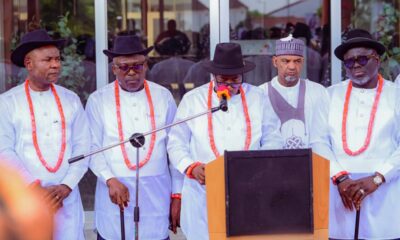News
Enugu Hands Over Medical Diagnostics Centre To NSIA
The Enugu State Government yesterday formally handed over the state diagnostic centre to the Nigeria Sovereign Investment Authority, managers of Nigeria’s sovereign wealth fund.
The State Governor, Ifeanyi Ugwuanyi, performed the handover during NSIA’s official launch of two of its flagship companies, the NSIA Advanced Medical Service Ltd (“MedServe”) and Equilease Systems Limited (“Equilease”), held at the Enugu State Diagnostic Centre Complex.
Ugwuanyi, in his speech, said “The physical and mental well-being of the workforce in any state is a function of the quality of healthcare services available.
“The partnership with NSIA to transform this facility with the promise of significantly better equipment and services will go a long way towards contributing to healthcare security in the state. With this, our state will be one of the few states equipped with world-class healthcare infrastructure and amenities,” he maintained.
Delivering his remarks on the three-part event, Mr Aminu Umar-Sadiq, the MD & CEO, NSIA, commended the state government for signing the agreement that necessitated the transfer.
Umar-Sadiq said “Over the past five years, we have built a strong and successful portfolio of healthcare service delivery centres.
“The transfer of the Enugu Centre for upgrade and rehabilitation is one of the steps in our journey towards making healthcare accessible and affordable for all Nigerians. The Centre is one of the 23 centres to be upgraded for Oncology and Diagnostic services.”
He added, “MedServe and Equilease are transformative, market-disrupting entities that will deliver a unique set of connected solutions to bridge the gaps in Nigeria’s healthcare industry. The outcome from the creation of these entities is expected to strengthen the industry’s value chain and unclog the constraints created by insufficient financial investments, inadequate manpower capacity and substandard services.”
Speaking specifically on the companies, Umar-Sadiq explained that MedServe is being set up to serve as the vehicle to deliver NSIA’s healthcare expansion objectives. Its goal according to him is to provide high quality and affordable healthcare services and ensure equitable geographic access to these services across the country.
“The company will develop, equip, and operate NSIA’s expanding portfolio of healthcare centres and offer first class medical services nationwide.”
About EquiLease, he stated that it is a specialised equipment leasing service provider. Conceived as a market disruptor, the company will provide medical equipment leasing services, leveraging its strategic advantage to catalyze investments in healthcare institutions and facilitating the acquisition of equipment to improve the quality of care in the country.
He noted that Equilease would partner with medical equipment manufacturers to offer innovative financing and leasing programs for advanced medical equipment. At the onset, it will offer services exclusively to MedServe as an anchor client.
The Federal Airports Au
thority of Nigeria has issued a warning to all illegal occupants of airport lands to vacate the premises for their own safety and security.
According to a statement yesterday, the General Manager, Corporate Affairs, Faithful Hope-Ivbaze, the recent demolition of 13 houses was because they posed dangers to the operations of the Murtala Muhammed International Airport in Lagos State.
She said, “The occupants of these buildings were duly notified of the impending demolitions and intensive awareness campaign through “stop work” markings and the planting of notice boards within the Red Zone.
“In September, 2022, FAAN wrote to LASG for their cooperation in conducting this exercise in the interest of Aviation and Communal Safety and Security.
“The removal of illegal structures is also scheduled to be carried out at all other airports that have similar challenges.”
Hope-Ivbaze further explained that the area of land currently housing the airport was acquired for public use by the federal government through the lands acquisition ordinance by the government official gazettes in 1944, 1972, and 1975, respectively.
She noted that FAAN noticed some encroachments within its acquired land and a committee was set up to investigate and compel those encroaching to cease and desist from such actions sometime in the year 2000.
“The committee thus put up “Caveat Emptors” and positioned them strategically within the areas under encroachment (they are still in place).
“Publications were done in national dailies and advertorial jingles in local radio stations, warning people of the risks in purchasing and building on Restricted Aviation Land without consideration to the direct dangers on aircraft operations and the building occupants themselves,” she said.
According to her, in 2008, “some residents of the Ajao axis of the encroached land, under the aegis of runview cooperative” approached the Authority for regularisation of their stay on the land.
She disclosed that the committee was charged with finding ways of identifying and regularising only those properties located in positions that do not pose direct and critical challenges to airport safety and security.
“To avoid a situation of wanton damage and colossal losses, the present administration, on assuming office, inaugurated a regularisation committee on FAAN encroached lands and property.
“The FAAN directorates of Airport Operations and Aviation Security commenced stakeholders’ engagements and met severally with the residents of the Ajao axis (all meetings recorded and filed), bringing to their knowledge the dangers of erecting houses on pipelines, waterways, and the airport’s perimeter fence (blocking access for security patrols).
“Most of the residents cooperated, except for the few who ignored and continued erecting their structures in the red zone.”
Hope-Ivbaze said that in the committee’s report submitted in 2022, out of 254 buildings evaluated, 220 buildings were recommended for regularisation as they pose no direct/critical security or safety challenges to the airport.
She added that the 34 others that were built within FAAN’s perimeter fence and mostly erected above the aviation fuel pipeline and waterways, clearly posing direct safety and security challenges to the airport and to their owners, and occupants themselves, were marked for demolition.
News
Fubara Attends PDPGF Meeting In Asaba …..Back Court Verdict On National Secretary Position

Rivers State Governor, Sir Siminalayi Fubara, last Friday, attended the Peoples Democratic Party Governors’ Forum (PDP-GF) meeting in Asaba, the Delta State capital.
The Rivers State Governor, who is the Vice Chairman of the PDP Governors’ Forum, attended the meeting, alongside 10 other Governors of the party’s controlled states across the six geopolitical zones of the country.
The first PDPGF meeting in 2025, was held at the Government House in Asaba, at the end of which a seven-point resolution was reached.
Reading the communique at the end of the meeting, the Chairman of the Forum, and Governor of Bauchi State, Senator Bala Mohammed urged the National Working Committee (NWC) to put every machinery in place to ensure a hitch-free NEC meeting on March 13, 2025.
The communique stated:
“The Forum, having examined all the notices required by law to be given to validly convoke NEC, advised NWC to reschedule NEC to the thirteenth (13Th) of March 2025.”
The Forum further noted the Court of Appeal judgment affirming Udeh Okoye as the National Secretary of the party, saying that as a party that believes in the rule of law, it will respect the position of the Appellate Court on the matter.
“The Forum noted with delight the ongoing efforts at resolving the crisis in the National Working Committee, NWC, on the position of the National Secretary, and has reaffirmed its support for the Court of Appeal judgment; consequently, the Forum advised the NWC to set up the machinery for the effective implementation of the court judgment.
“While commending the country’s valiant and patriotic Armed Forces and Security Agencies for maintaining the frontline in securing the country and the gains of our gallant personnel against bandits in parts of the country, the Forum viewed with deep concern, the resurgence of brazen non-state actors. It, therefore, calls for the strengthening of the nation’s security architecture.”
Governors in attendance include: H.E Senator Bala Abdulkadir Mohammed (Bauchi State); H.E Sir Siminalayi Fubara (Rivers State) – Vice Chairman; H.E Rt. Hon. Sheriff Oborevwori (Delta State) – Host; H.E Dr. Agbu Kefas (Taraba State); H.E Rt. Hon. Ahmadu Umaru Fintiri (Adamawa State); and H.E Dr. Dauda Lawal (Zamfara State).
Others are H.E Senator Ademola Adeleke (Osun State); H.E Senator Douye Diri (Bayelsa State); H.E Pastor Umo Eno Ph.D (Akwa Ibom State); H.E Dr. Peter Mbah (Enugu State); H.E Barr. Caleb Mutfwang (Plateau State);
and H.E Bayo Lawal (Deputy Governor, Oyo State), who represented Governor Seyi Makinde.
News
NGO Implants Free Pacemakers Into 22 Cardiac Patients In PH
A United States based Non Governmental Organisation, Cardiovascular Education Forum, in collaboration with the University of Port Harcourt Teaching Hospital (UPTH), has successfully implanted free pacemakers into 22 patients with different cardiac cases in Port Harcourt.
This is in a bid to save lives and encourage patients with low heartbeats to live longer.
The implantable device, which costs $20,000 each, was inserted free of charge on the selected patients.
Speaking during a Special Hospital Ground Rounds at the UPTH with its Theme, “Recent Advances in Cardiac Pacing,” a cardiac Physiologist, Dr Neil Grub, said the NGO was in Nigeria to improve training and learning on cardiac issues and help patients with cardiac problems.
Accompanied by a team of experts comprising a cardiologist and cardiac device implanter, Dr Jagdeep Siagh, and UPTH interventional cardiologist, Dr Edafe Emmanuel, Dr Grubb said pacemakers were inserted on patients with low heartbeats to boost their heart rates.
Earlier, the Chief Medical Director, UPTH, Prof Henry Arinze Ugboma, said each of the implantable devices cost over $20,000.
Ugboma, represented by the Chairman, Medical Advisory Committee, UPTH, Prof Datonye Alasia, said the partnership between UPTH and the foreign NGO was to build networks, and improve services in terms of healthcare delivery, training and learning.
According to him, there is now a ray of hope in terms of treatment of patients with cardiovascular cases in the hospital.
He said the UPTH started the collaboration with Cardiovascular Education Forum in 2018 to boost health, training and learning on cardiac health.
He assured that, “in coming years, the scale of our collaboration with the mission will be higher.”
Chinedu Wosu
News
FG Unveils National Broadband Alliance To Drive Internet Access
The Federal Government has unveiled the National Broadband Alliance, a new initiative aimed at transforming the nation’s digital infrastructure and boosting connectivity across the country.
The initiative was unveiled yesterday in Lagos by the Minister of Communications, Innovation, and Digital Economy, Bosun Tijani, who was represented by the Executive Vice Chairman of the Nigerian Communications Commission, Aminu Maida.
In his address, Tijani stated that NBAN would significantly enhance broadband penetration, which has grown from just six per cent in 2015 to approximately 42 per cent as of October 2024.
To support this agenda, he said the government was leveraging a Special Purpose Vehicle to deploy 90,000 km of fibre backbone across the nation, connecting underserved and rural communities to high-speed internet.
According to him, the initiative aligns with the Renewed Hope Agenda of President Bola Ahmed Tinubu, which prioritises innovation, technology, and collaboration as key drivers of national prosperity.
Tijani stated that the expansion would not only improve access to reliable broadband but also empower Nigerians, particularly in rural areas.
“While the progress made in broadband penetration is commendable, we recognise that much more needs to be done to ensure every Nigerian can enjoy the benefits of reliable, high-speed internet,” Tijani said.
The minister also emphasised the importance of strategic partnerships with donors, investors, and other key stakeholders in achieving the goals set out in the National Broadband Plan (2020–2025).
He said these collaborations would be essential in overcoming infrastructure development challenges and making broadband affordable and accessible for all Nigerians.
“These targets reflect our unwavering commitment to ensuring that broadband is accessible, affordable, and inclusive for all Nigerians. However, we are also aware of the challenges ahead,” he added.
Tijani stressed that achieving the government’s targets—70 per cent broadband penetration by 2025, a minimum internet speed of 25 Mbps in urban areas, and broadband access for 80 per cent of the population by 2027—will require sustained efforts.
“Achieving these goals will require more than just the efforts of the private sector. It will require a holistic approach that includes strategic partnerships with donors, investors, and other key stakeholders in accelerating the rollout of critical infrastructure,” he said.
-
Rivers14 hours ago
NOSDRA D-G Disburses N150m To 300 Farmers In Rivers
-

 Niger Delta13 hours ago
Niger Delta13 hours agoOgoni Postgraduate Forum Tasks HYPREP On Scholarship Scheme
-
Business14 hours ago
NCDMB Assures Greater Local Industry Participation In Oil, Gas Projects
-

 News16 hours ago
News16 hours agoNigeria Strengthens Economic Ties With Germany To Boost Investment, Jobs
-

 Featured13 hours ago
Featured13 hours agoFubara Flags Off Upgrading Of 135 Primary Healthcare Facilities In Rivers
-
Rivers14 hours ago
Bonny Protest Neglect, Seeks CSR MoU Implementation
-
Nation13 hours ago
FG Begins Tolling On Abuja-Keffi-Akwanga-Makurdi Highway
-
Business14 hours ago
NDYC Seeks NDDC Commercialisation … Uncompleted Projects Completion

